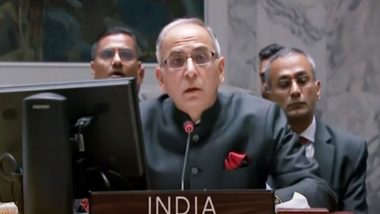New York, November 4: India on Thursday slammed Pakistan and China on terror and said that the international community should collectively call out those who provide safe haven to terrorists and stand with them including in the UNSC sanctions regime.
"We must collectively call out those who provide safe havens to terrorists as also those who stand with them and come to their defence including in the UNSC sanctions regime," Foreign Secretary Vinay Kwatra said during a UNSC briefing in New york. Paul Pelosi, US House Speaker Nancy Pelosi's Husband, Discharged From Hospital After Successful Surgery.
Describing the changing scenario of conflicts in the present time, the Foreign Secretary further said that the nature of conflicts has undergone paradigm shifts and it has become more complex and uncertain. However, India strongly recognises the privacy of national governments and authorities in identifying and driving priorities, strategies and activities for sustaining peace.
"Today both the political and security environment and the nature of conflicts have undergone paradigm shifts. It has become more complex, uncertain, volatile and unambiguous, Kwatra said." During the briefing, he also laid emphasis on UN peacekeeping missions and said that the need of the hour is a holistic approach and highlighted India is an active member of the peacebuilding commission.
"Missions are often burdened with objects that go beyond the traditional mandate of peacekeeping...need of the hour is a holistic approach. Indian peacekeepers, nearly 5800 personnel are deployed in 9 out of 12 active UN peacekeeping missions. We have also been active members of the peacebuilding commission," the Foreign Secretary added. Elon Musk to Begin Layoffs at Twitter, Leaked Email Hints at Sacking of 7,500 Employees: Report.
Regarding the situation of peacekeeping and peacebuilding globally, India, as the world's largest democracy believes that representative and inclusive governance structures will help stabilize peace and safeguard fundamental rights. Last week, India also revealed in detail Pakistan's role in the 26/11 Mumbai terror attack by playing Pakistan-based terrorist Sajid Mir's audiotape.
In the audio clip, he is heard directing the attack on Chabad House during Mumbai 26/11 terror attacks. Open debate on issues of peacebuilding and sustaining peace. as he thanked Guterres for his insights as also the other briefers for a useful and important briefing Concluding teh open debate of the UNSC on issues of peacebuilding and sustaining peace, Foreign Secretary Vinay Kwatra reiterated that India has always strongly advocated for keeping the peacekeeping mandates objective, well-defined and focused.
"Indian peacekeepers nearly 5800 military and police personnel are today deployed in 9 out of 12 active UN peacekeeping missions," he said at the UNSC.
Meanwhile, China, in recent months, has blocked several bids to designate several terrorists based in Pakistan. Beijing this month put on hold a proposal to list Talha Saeed, son of Lashkar-e-Taiba (LeT) chief Hafiz Saeed. This bid was moved by India and co-supported by the US, under the 1267 sanction regime.
It was the fifth time that China has blocked an India-US proposal in recent months, Lashkar-e-Taiba member Shahid Mahmood in October, Lashkar-e-Taiba (LeT) terrorist Sajid Mir in September, LeT and Jamaat-ud-Dawa (JuD) leader Abdul Rehman Makki in June, as well as Abdul Rauf Azhar in August, the brother of Jaish-e Mohammed (JEM) chief Masood Azhar, were protected by Beijing. Further, many Indian officials raised the issue of delisting Pakistan from the Financial Action Task Force (FATF) grey list and said that Pakistan delisting from FATF can increase terror attacks.
(This is an unedited and auto-generated story from Syndicated News feed, LatestLY Staff may not have modified or edited the content body)













 Quickly
Quickly




















